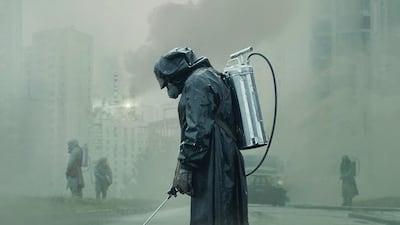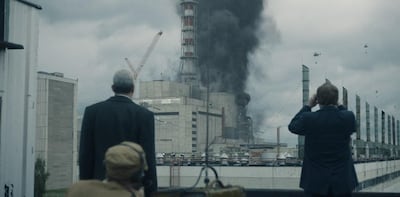Did you say greatest TV series ever? That's quite a claim… I did. Well, technically, I Didn't, but the millions of readers of cinephile website IMDB did. The show shot straight to the top of the website's, user-voted, list of the greatest TV shows ever last week, before it had even finished its five-episode run on HBO in the US, and Sky Atlantic in the UK. That puts it above Breaking Bad (#5), Game of Thrones (#6) and Black Mirror (a disappointing #32). That's quite an impressive feat, and you don't need to take it from me – that's democracy speaking.
OK, sounds good. So what’s it about?
Well, stop me if you’ve heard this one before as the story is already in the public realm, but on April 26, 1986, Reactor Four of the Vladimir Ilyich Lenin nuclear power plant in the city of Pripyet, Ukraine, better known as Chernobyl, suffered a disastrous explosion that led to a meltdown of the facility’s core and, in a nutshell, the world’s worst nuclear disaster to date. There was a period when it looked like most of Europe could become uninhabitable for 24,000 years or so, so it wasn’t pretty. The miniseries tells the story, and the story of those who worked to avert a worse catastrophe than the then-Soviet Union already had on its hands.
It doesn’t sound very cheerful?
No, you've got me there. The show is retelling an apocalyptic story, made worse by the efforts of the Soviet Union to cover up the events, the fact that none of the scientists involved really knew what to do as this had simply never happened before, and the political machinations to shift blame while, quite simply, people were dying horrible deaths. Oh, and the fact that the whole incident could essentially be put down to cost-cutting in the manufacture of Soviet fuel rods.
As many as 93,000 people died, according to international NGOs, although that doesn’t take into account the raised rates of cancer and birth defects that persist in parts of Ukraine and neighbouring Belorussia to this day.
The Soviet government's official death toll was 31. It's not the Teletubbies.
It can’t be that bleak can it?
It can I’m afraid. We’re talking rotting human bodies being desperately interviewed in makeshift hospital beds to try and find out what went wrong before they shuffle off this mortal coil, civilians being drafted in to cull the local population of contaminated domestic pets before they can roam around and spread radiation poisoning, lead coffins being buried in super-deep graves then covered with concrete, the lot.
Sample moment of levity: On realising that a door inside the reactor needs to be manually opened to avert an even worse catastrophe, Jared Harris’ nuclear physicist Valery Legasov to General Secretary Gorbachev: “I’m asking for permission to kill three men.”
There’s not a lot of slapstick.
But there are some light-hearted moments, right?
Err, not really. I recall one joke in the six-hour marathon, when the clean-up team draft in a lunar rover to try and clear the radioactive debris from the reactor’s roof.
“So that’s what we put on the moon,” says Stellan Skarsgard’s Deputy for Energy. “Well, not that one,” retorts Jared Harris’ nuclear physicist, as the control room erupts in laughter and party poppers are let off.
Lebanese actor Fares Fares also puts in a solid shift channelling Kevin Smith’s Silent Bob as he spends an entire 60-plus minute appearance as a silent Armenian soldier who speaks just once to deliver a single line of high philosophical worth before reverting to silence, but you’d have to be a total geek to even spot that moment of pseudo-levity.
So it’s totally depressing then?
Actually, no. The series does a great job of telling the stories we don’t know of simple bravery and heroism. The miners who worked naked, 24-hours a day, under a burning nuclear disaster, to tunnel under the reactor and implant the Soviet Union’s entire stock of liquid nitrogen as a heat exchanger to prevent the radiation melting down to the water table and infecting all of Eastern Europe’s water supplies. The three previously mentioned heroes who waded through radioactive water to open the door that would drain sluice tanks to prevent a further escalation (two of whom, amazingly, survive today). On a macro level, it’s dark. On a human level, maybe there’s hope for us all yet.
This doesn’t sound like the USSR comes across too well. How’s it gone down in Russia?
Well, that would depend who you ask. It’s gone down remarkably well with audiences.
Although Chernobyl hasn't been screened on terrestrial TV, it's been legally streamed on Amediateka, a kind of Russian Netflix, and garnered a 9.1 rating on Kinopoisk, the Russian equivalent of IMDB.
Officialdom has been less welcoming however, to the degree that NTV, a state-owned channel that is a division of Gazprom's media arm, has announced it is releasing its own show to counter Chernobyl's story. This version of events will show us how the CIA were responsible for the events that took place in 1986, apparently, and is currently in post-production with the help of a half million dollar grant from the Russian ministry of culture.
Ok, you convinced me. But can I watch it in the UAE?
Yes, you can. As of June 3, Chernobyl is airing weekly every Monday at 10pm (UAE) exclusively on OSN Series First. If you missed the first episode because OSN seems to have been quiet about airing the show, you can catch-up on OSN Play. Episode two will air tonight, June 10, at 10pm.


